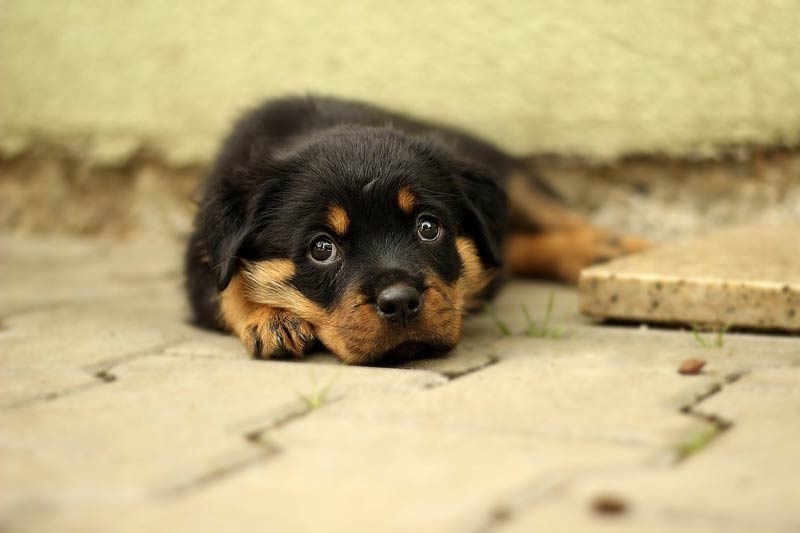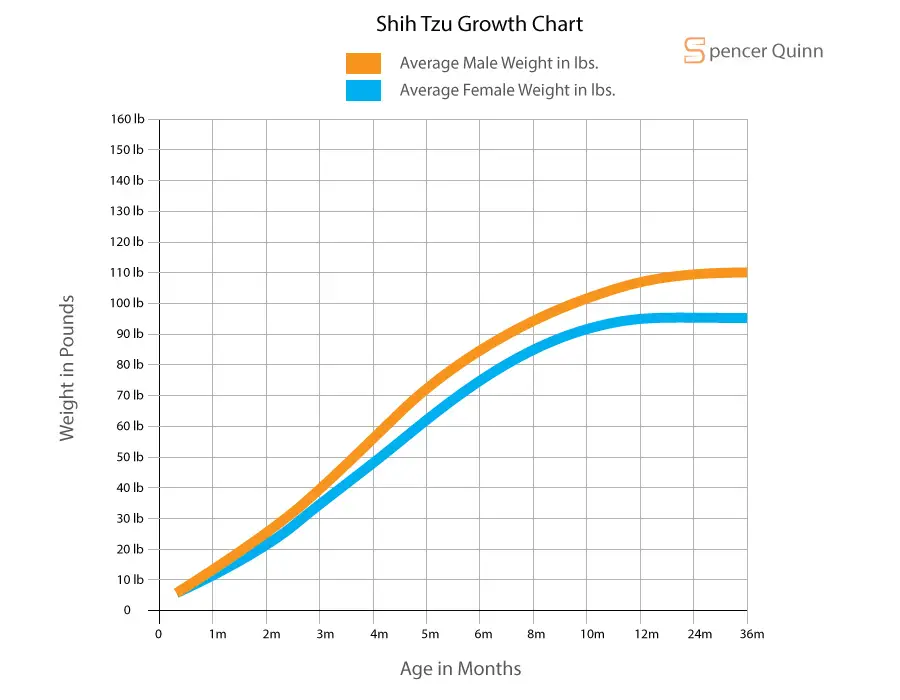How Much Should I Feed My Rottweiler

You've probably known the Rottweiler as a guard dog breed, seeing that they are almost always the start of the show in crime movies when the police start a search and rescue operation or secure an area from bombs. Behind the strong front lies proper care to maintain the Rottweiler's health, so how much should you feed a Rottweiler puppy?
The hardworking, fearless, obedient, and brave Rottweiler is a great companion when fed properly from their puppyhood to their adult years. If you want them to become awesome guard dogs or family companions in the future, you'll have to secure their health by feeding them right.
Weight issues are quite common for a Rottweiler from their puppy years and even up to adulthood, which is why you'll need to discipline them while they are young. Don't let them get obese and unhealthy!
With this guide, we want to help you make the most out of your puppy's precious younger years and train them to eat only the food they need so they don't get overweight. Remember that the lifespan of our little Rottweiler puppy largely depends on how they eat, when they eat, and what they eat.
Page Contents
- 1 How much to feed a Rottweiler puppy?
- 2 Feeding Chart
- 3 Growth Chart
- 3.1 2 to 4 weeks old
- 3.2 6 weeks old
- 3.3 8 weeks old
- 3.4 10 weeks old
- 3.5 12 weeks old
- 4 Recommended Food
- 4.1 Foods rich in omega fatty acids
- 4.2 Glucosamine and chondroitin-rich foods
- 4.3 Calcium-rich foods
- 4.4 Vitamin A-rich foods
- 5 Foods to Avoid
- 5.1 Unnecessary fillers
- 5.2 Fat-rich foods
- 6 FAQs on Feeding a Rottweiler Puppy
- 7 Raw feeding a Rottweiler puppy
- 8 Conclusion
How much to feed a Rottweiler puppy?
A Rottweiler pup should be eating at least 3 times a day but the amount of food will vary depending on their age bracket (in weeks). They may have spikes in their growth so they could be eating more in certain periods but eating less later on.
Generally, you can feed a Rottweiler pup as little as 3/4 cups and as much as 1 3/4 cup a day while they are still small and young. As they grow up, you can increase that depending on the puppy's weight. We have a chart below to help you figure out how much they should eat.
Feeding Chart
As mentioned above, Rottweiler puppies need to be fed differently depending on their age, growth spurts, physical activity, and so on. There's no single rule to feeding a Rottweiler pup because every puppy grows differently from the others. However, here is a rough estimation to guide you:
| Weight in pounds | Minimum per day (cups) | Maximum per day (cups) | Amount in wet food (ounces) |
|---|---|---|---|
| 5 | 3/4 | 1 3/4 | 6 – 14 |
| 10 | 1 3/4 | 3 | 14 – 24 |
| 20 | 3 | 5 1/4 | 24 – 42 |
| 40 | 5 1/4 | 7 | 42 – 56 |
| 60 | 8 2/3 | 70 | |
| 80 | 8 2/3 | 70 |
Based on the chart above, you'll see that the heavier your Rottweiler puppy gets, the more nutrition they will need. The Rottweiler belongs to the medium-large breed category and they can even weigh as much as 135 pounds when they turn adults. Big dogs need much more food compared to other breeds.
Growth Chart
Are you curious to see how big your Rottweiler puppy will grow in a few months? To check if your puppy is doing fine and if you are feeding them properly, here is a handy growth chart to guide you:
| Age in Month | Female Weight | Male Weight |
|---|---|---|
| 1 month | 7-8 lbs. (3-3.6 kg) | 8-10 lbs. (3.6-4.5 kg) |
| 2 months | 18-20 lbs. (8-9 kg) | 18-22 lbs. (8.1-10 kg) |
| 3 months | 30-36 lbs. (14-16 kg) | 30-40 lbs. (13.6-18 kg) |
| 4 months | 42-52 lbs. (19-23 kg) | 43-58 lbs. (19.5-26 kg) |
| 5 months | 53-66 lbs. (24-30 kg) | 55-75 lbs. (25-34 kg) |
| 6 months | 60-78 lbs. (27-35 kg) | 62-90 lbs. (28-41 kg) |
| 8 months | 70-93 lbs. (32-42 kg) | 75-110 lbs. (34-50 kg) |
| 10 months | 78-100 lbs. (35-45 kg) | 80-120 lbs. (36-54 kg) |
| 12 months | 80-105 lbs. (36-47 kg) | 82-125 lbs. (37-57 kg) |
| 24 months | 80-110 lbs. (36-50 kg) | 85-135 lbs. (39-61 kg) |

Male Rottweiler puppies develop differently from females, both with weight and height. Again, these are just estimates and it shouldn't reflect all Rottweiler pups as yours could grow differently. It's best to consult your vet and have them weighed in the clinic.
With that said, let's get into further details on how your Rottweiler puppy develops from their younger years to adulthood:
2 to 4 weeks old
During the first two weeks, your Rottweiler puppy should be nursed by their mother. They cannot be fed solid food yet because their tummy doesn't permit so. Have them stay by their mother's side until the nursing has finished.
Remember to keep a place specifically for the mother and her litter to be nursed without disturbance. Avoid foot traffic that may otherwise make the mother and the puppies panic. Also, look for signs of puppies getting thinner than the other members of the litter.
If this is the case, your vet might recommend a puppy supplement or formula that will replace the mother's milk. This also happens if the mother of the Rottweiler puppies cannot produce sufficient milk, especially for a large litter.
When your Rottweiler pup reaches 4 weeks old, they can be introduced softly to kibble but with added water. The purpose of the water is for your puppy to easily digest it since they might not do well with pure solid food at first.
Try offering the mixture several times in the day but don't be disheartened if they don't try it. You can also feed them only a few amounts to test because some Rottweiler pups might not be ready for weaning just yet.
Remember that each puppy grows differently from one another so don't feel pressured when one pup is already eating solid food and the other is still mostly dependent on being nursed. At the end of each feeding session, take out any untouched food and don't leave it there for too long.
6 weeks old
When your Rottweiler puppy turns 6 weeks old, make sure that they are still trying a little bit of the puppy mixture. You can tone down the liquid content to get them to eat the puppy food more. In this way, you are transitioning them to solid food as smoothly as possible.
Don't worry if your Rottweiler puppy is still drinking their mother's milk at this point – weaning is something done slowly but steadily. Don't expect them to fully detach from being nursed overnight! The mother might not nurse them as eagerly as before but there will still be times that they do – usually standing up.
A good feeding schedule for a 6-week-old Rottweiler puppy is 3 meals per day and about 1 cup of food, which is equally divided (1/3 cup per meal). Eventually, if your puppy has already transitioned to solid food, they should eat kibble and/or wet food just fine.
8 weeks old
By the time your Rottweiler puppy reaches 8 weeks of age, they are likely fully weaned. This is the time to separate the puppies from their mothers, whether you will adopt them, get them adopted by a new owner, or just have them roam around the house.
Keep the daily food amount to less than a cup because they are still quite young and might not do well with big diets just yet. Breeders should inform the new pet owners to stick to the previous schedule of 3 meals a day and include the brand of puppy food that they used.
When transitioning from one brand of food to another, in case of the food brand not being available, ensure that you do it in parts. First, put a little bit of the new food in the old food, gradually increasing the amount of the new brand until it takes over their dinner or lunch plate.
If you will adopt a new Rottweiler puppy, ensure that you get all the information from the breeder, such as their eating habits, their activity time, their feeding schedule, and whatnot. This will help you to maintain their nutrition.
A Rottweiler puppy that moves into a new environment could get scared and uneasy – don't feel disheartened if they aren't eating at first. You can try feeding them solo for a few days and then have them socialized later on. Stressed puppies usually take some getting used to their environment and might not eat right away.
10 weeks old
Your Rottweiler puppy could have a surge of hunger pangs during their 10th week, so be wary and stock up on food! They could also gain a lot of weight but make sure that they stick to their ideal weight for their age to avoid being overweight.
There can also be cases when your Rottweiler puppy might get too excited, but don't take it as begging for food or being hungry all the time! Remember to limit their consumption per day – the ideal amount for 20-pound Rottweiler puppies should be at least 3 cups that are equally divided into 3 meals.
12 weeks old
When your Rottweiler puppy turns 12 weeks old, it might become as heavy as 40 pounds depending on various factors, such as the type of food, nutrients, physical activity, and genetics. Generally, as said above, males tend to be heavier than females.
You may want to increase the daily food intake of your Rottweiler puppy to 5 cups a day but still feed them 3 times. The idea is to not spot the ribs visually but should contain just the right amount of puppy belly that isn't protruding.

Recommended Food
A good plan for your Rottweiler puppy's nutrition is to check which diseases are more likely to appear during their adulthood and find nutrients to fight the onset of such health problems. Let's take a look at some recommended foods for your Rottweiler pup:
Foods rich in omega fatty acids
Heart problems are common among Rottweiler puppies when they grow older, and this is why they'll need omega fatty acids in their diet. Examples of foods that contain such nutrients are seafood, fish, fish oil, and flax seeds.
Glucosamine and chondroitin-rich foods
Because the Rottweiler is prone to ligament damage, osteochondrosis, and hip dysplasia, you'll want to feed them with healthy foods that contain glucosamine and chondroitin. You'll find these in higher-end puppy foods that aren't often found in the supermarket.
Calcium-rich foods
A Rottweiler puppy will benefit from the calcium in their diet because it strengthens their bones. They are prone to obesity and weight issues, which also take a toll on their bones. Look for foods that have calcium – you can also ask your vet if they are suitable for a calcium supplement.
Vitamin A-rich foods
Carrots and other vegetables that are rich in vitamin A should be in your Rottweiler puppy's diet. That's because this breed is prone to eye problems, such as cataracts. Look for puppy food in the grocery that contains such Vitamin A sources or you can buy fresh produce from your local market and use it as a topper for your puppy food.
Foods to Avoid
Here's what you should avoid when feeding your Rottweiler puppy:
Unnecessary fillers
Generally, you would only want to avoid foods that are filled with unnecessary carbohydrates, such as fillers like corn and wheat. They not only add bulk to your puppy but they might also make them more prone to health issues.
Obesity is a big problem for Rottweiler puppies because they could eat too much due to excessive begging. Simply look for food that doesn't contain fillers and artificial flavors and your Rottweiler pup should be fine.
Fat-rich foods
You might also consider not giving your Rottweiler puppy too many foods that are rich in fat. Wet or canned food is generally more packed than kibble so you may want to lessen their wet food and focus more on dry food.
FAQs on Feeding a Rottweiler Puppy
Do you want to know more about feeding your Rottweiler pup properly? We have some FAQs that will help you make the most out of your routines for your little companion:
How do I choose the right food for my Rottweiler puppy?
As mentioned above, choose foods that are low in calories and fat because we don't want a Rottweiler puppy to become obese during their adulthood. This breed is more prone to obesity compared to others, which is why weight management is very important.
If your Rottweiler puppy is quite active or if you intend to become a working dog in the future, you might also want to increase their protein intake for stronger muscles, as well as improved joints to combat the onset of hip dysplasia.
Should I give my Rottweiler puppy supplements?
Yes and no – it depends on what your veterinarian advised. Generally speaking, food supplements are okay, provided that you have a go signal from your vet. However, they shouldn't be self-medicated for your Rottweiler puppy, especially if nothing is wrong with them physically.
What matters the most when feeding your pup is the balance of nutrients. You will never know if your Rottweiler puppy is feeding on too much of a certain nutrient, which will cause them to have a deficiency of another. Always consider your vet's expert advice on giving your puppy supplements.
What should I do if my Rottweiler puppy won't eat?
Did your Rottweiler puppy just recently move to your house? Are there any strangers or new visitors? If so, those could be stressors that are likely preventing your puppy from eating happily and comfortably.
Eating stress is normal if you've just adopted your Rottweiler puppy since they are still getting used to their new surroundings. It could also be the food that they are eating – they might not like it so you will have to change the brand, add, or subtract a little bit depending on their tastes.
Remember that feeding Rottweiler puppies, like any other canine pup, requires dedication, patience, and a series of trials and errors. If your pup is extremely picky, it will be difficult, but sooner or later, you will eventually find a puppy recipe that they will like!
Now that we've cleared those possible reasons, if you notice that your Rottweiler puppy hasn't eaten for quite a long time (more than a day), you should take them to the vet right away for assessment. It could be a dental issue or an underlying health problem.
Raw feeding a Rottweiler puppy
If you want to go for a BARF diet (biologically appropriate raw food, otherwise known as bones and raw food) for your Rottweiler puppy, you should get the expert advice of your veterinarian or your breeder. Know if your puppy is okay to be fed with raw food and the specifics about preparing it.
Generally, Rottweiler puppies can be fed raw food, which may include chicken, organs, beef, vegetables, and the like. However, keep in mind that you have to calculate the number of nutrients and calories plus set aside time to prepare their meals versus just dumping kibble on their bowls.
Conclusion
Wrapping it up, Rottweiler puppies need a well-balanced diet to keep them away from obesity and other health issues. If you feed them as scheduled and keep them fit through exercise and other physical activities, your Rottweiler pup will grow up to be healthy, strong, and a longtime loyal companion. We hope you liked our Rottweiler puppy feeding guide!
chalmerspenig1948.blogspot.com
Source: https://spencequinn.com/rottweiler-puppy-feeding/
0 Response to "How Much Should I Feed My Rottweiler"
Post a Comment